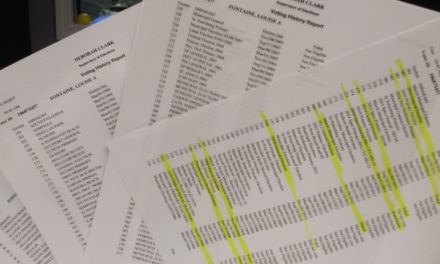In proposing the creation of The Manchester Academic Standards (TMAS), Superintendent of Schools Dr. Debra Livingston assured the public the process would be transparent. In her PowerPoint presentation to the Board of School Committee, Livingston said that communication was key to successfully implementing a plan and promised monthly status reports to the board and its Curriculum and Instruction Committee. Following comments made by board members noting that Common Core “wasn’t rejected,” despite not being adopted, and pro-Core advocates claiming the board actually adopted the standards, as in this mind numbing article which totally twists the board’s actions, transparency in this process is absolutely critical. To that end, this article is written to suggest how to ensure the public is not only “informed,” but also involved. (Note: Our analysis of the confusion and how to clarify it is here.)
Public participation is necessary, not just because pro-Core forces have remade the board’s actions to fit their agenda, but because Ward 9 Committeeman Arthur Beaudry‘s attempt to give the public a “direct seat at the table” was rebuffed by the board. Add to that the vague motion authorizing Superintendent Livingston to work with district educators and staff and use all resources at their disposal to create the TMAS, and there are legitimate questions about who will be doing the work, how it will be presented to the public and what opportunity there will be for public input.
In addition to the aforementioned monthly reports, Livingston said information will be posted to the district’s Web site and have a special icon on the front page so parents won’t have to go looking for it. While this is likely an improvement over the current situation, where one must know exactly where to look to find the current Common Core aligned curriculum guides, or patiently suffer through a Where’s Waldo search to find them, it remains unclear exactly what will be posted and when.
While opponents of Common Core are pleased to see Manchester decide to develop its own standards, the items previously mentioned have caused great concern, if not cynicism, about the TMAS initiative and called into question whether or not it is simply, as stated in the article referenced above , “a model for any district wanting to diffuse Common Core controversy locally: just resolve to make its own standard – with the Common Core as the ‘floor,’” which isn’t an entirely disingenuous representation of Livingston’s proposal, which also defended the use of “informational texts,” a target of Core opponents, which did not go unnoticed.
True transparency is the only way to guarantee that Manchester won’t spend the next several months having to deflect criticism from justifiably suspicious parents who, despite intense efforts to discredit them, have made it impossible for the board to settle for the Common Core State Standards, which even supporters acknowledge, aren’t the best that could be had.
For these reasons and those that follow, the following suggestions are offered:
First: The Superintendent should publicly announce whatever committees and organizational structure will be put in place to develop the standards. Disclosure of who will serve on them and what process they will follow so that the public will know who will be involved and how things will work is of paramount importance.
In releasing the names of those appointed, the district should disclose whether or not they were involved with the creation of the curriculum guides aligned to the Common Core standards. Frankly, these people should be left out of the process to avoid even the appearance that they’re protecting their prior work rather than working to establish new standards. Those involved in other ill fated efforts, like the ones that led to the adoption of Everyday Math and other failed programs, should also be disclosed, though preferably avoided. These “experts” recommended “the latest and greatest” fad theories with little data to recommend them over the “tried and true” with demonstrable track records. Hopefully, the district will take MEA President Ben Dick up on his offer to help the district find and involve “new blood” instead of the “same old.”
Second: The Superintendent should disclose exactly how reports to the board and C & I Committee will be presented. Will they be attached to each body’s agenda so the public has the opportunity to see them in advance and provide comment on them at the meeting? Will they be posted to the district’s Web site at a regular interval even sooner than the publication on agendas, which would better enable the public to review and provide feedback at upcoming meetings? Or, as with the “Superintendent’s Report” to the board, will it merely be a line item where someone comes in and says “this is where we are” or “this is what we’ve developed to date,” which deprives the public of the opportunity to review and prepare comments in advance? This is not a trivial matter. It is the crux of transparency enabled information dissemination that enables public involvement.
Third: The Superintendent should formally solicit the public to suggest standards the district should consider as part of this process and also to submit comments on anything proposed. Many of those who voiced their opposition to the standards had “the credentials” to do so and their commentary will likely be valuable. After all, Beaudry correctly noted that it was the district’s “professionals” that recommended things like “Everyday Math,” which, he noted, has been such a disaster, the district’s about to abandon it.
Fourth: The Superintendent should reach out to the Common Core content experts in Math and English who refused to validate its standards. Both Dr. James Milgram (math) and Dr. Sandra Stotsky (English), who offered their assistance to the city in interviews on our show, have developed standards with proven track records of success. From designing a proper process, to suggesting standards, to providing feedback on proposed standards, Milgram and Stotsky would be invaluable to the efforts to establish TMAS. Milgram’s interview is here. Stotsky’s first interview is here, the second one is here.
Fifth: Before adoption, any standard should be presented and explained to the public in a formal setting so it can know how its commentary affected the drafts, if at all, and final feedback can be provided. The explanation should include what standards were considered and the basis for which ones were chosen or the basis for what was independently developed. If the effort to establish TMAS is to succeed, there must not only be a publicly understood and transparent process, there must also be public buy in and acceptance, which can only come if the public believes its input was considered, if not incorporated. As I write this, I’m reminded that once upon a time the NH Department of Education said the state’s Grade Level Expectations were “minimum standards,” school districts could add to and build upon. Few if any districts did that. So, Manchester must truly look to adopt superior standards and explain/justify/defend why it believes what it proposes is the best that can be done before the public whose children will be educated to achieve them.
The district has established an aggressive timeline to develop these standards and integrate them into the schools. Some say this timeline is so aggressive that only a repackaging of Common Core, which was ardently defended and advocated for by top administrators just a month ago, is possible. Some will say that public involvement on this scale, will slow the process, making it difficult, if not impossible to meet the announced deadlines in May and September. Both perspectives are wrong headed and will likely lead to continued, vigorous opposition that will embroil the districts efforts.
Core opponents are very eager to see Manchester establish superior standards. They are hopeful that and excited by the prospect that doing so will revolutionize public education in New Hampshire and beyond. Their considerable energy and expertise can help advance the development of TMAS if they are included via an open, transparent process that started by depriving them of a formal role. District officials have launched a bold initiative that, if successful, will single handedly dispel Manchester’s reputation as a troubled, failing district, reinvigorate educational enthusiasm and expand student opportunities by focusing on academic excellence.
Without a transparent process that capitalizes on the stated desires of all factions and brings to the table as many district and non district resources as possible, trust will not be built, communication will not be fostered and the effort will fail, missing the best opportunity to do something truly bold, meaningful and effective to improve education for the kids in decades.






If Manchester school district is going to continue to allow the REGIONAL liaison, tasked with helping implement Common CORE State Standards (CCSS), to “PARTICIPATE” in monthly meetings with the superintendent, principals and curriculum & instruction admins, even though the School Committee said CCSS was not good enough for Manchester students….. then the district must also allow parents to OBSERVE the process of developing the new Manchester Academic Standards.
What is this regional liaison and what is its function?